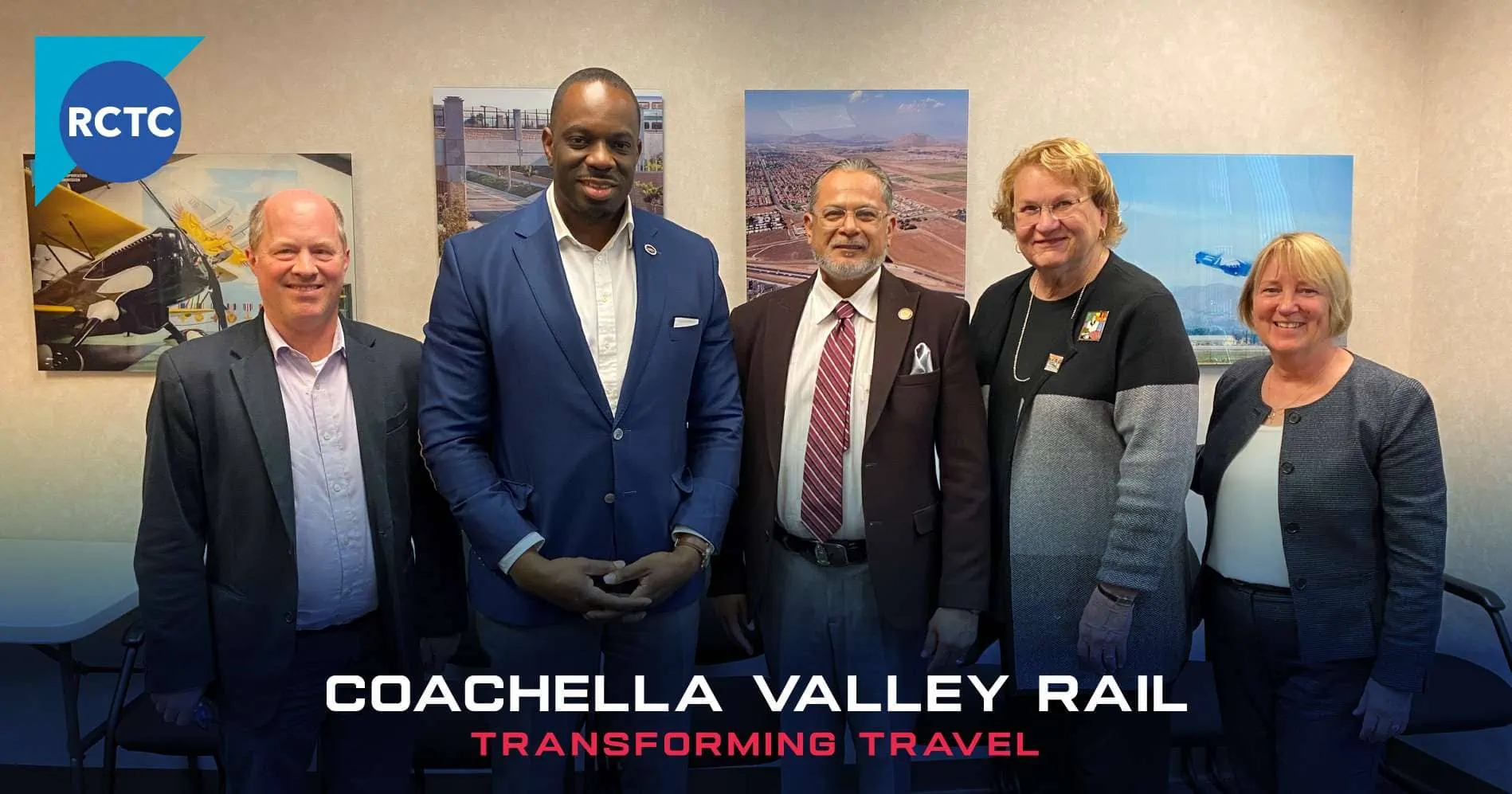The Point: Discussions continue to increase awareness about transformational CV Rail project as RCTC seeks federal funding
RCTC Chair and Riverside County 4th District Supervisor V. Manuel Perez and Commissioner Lisa Middleton, Mayor of Palm Springs, met with California State Transportation Agency (CalSTA) Secretary Toks Omishakin earlier this month in Riverside to discuss proposed passenger rail service between Los Angeles and Coachella Valley.
The meeting offered an opportunity for Secretary Omishakin to hear first-hand how the planned Coachella Valley Rail (CV Rail) service will transform travel across Riverside County, the region, state, and nation.

Chad Edison was reappointed Chief Deputy Secretary for Rail and Transit, Secretary Toks Omishakin, Chair V. Manuel Perez, Commissioner Lisa Middleton, RCTC Executive Director Anne Mayer
CV Rail discussions are taking place all over southern California, including the Coachella Valley and San Gorgonio Pass. RCTC staff recently presented to the Indio and Banning city councils, with more presentations on the way to other cities. Staff also provided a project overview to the Coachella Valley Economic Partnership and the Palm Springs Hospitality Association last month. In September, RCTC attended a roundtable discussion with California’s Infrastructure Advisor and former Los Angeles Mayor Antonio Villaraigosa. CV Rail was specifically mentioned as a once-in-a-generation project that will benefit all communities and support our region’s growth. These efforts built upon meetings with federal elected officials and staff in Washington, D.C., in September, in which RCTC representatives sought support for grant funding.
All of this outreach is helping spread the word about CV Rail. This is especially important as RCTC seeks federal funding to complete the “Tier 2” project-level engineering and environmental studies – an in-depth analysis of the service and operations along the planned 144-mile route, which crosses Riverside, San Bernardino, Orange, and Los Angeles counties.
RCTC is seeking $20 million to help fund the Tier 2 studies, which are expected to cost $60 million. Funds are available through the federal Consolidated Rail Infrastructure and Safety Improvements (CRISI) Program on a competitive basis. RCTC and Caltrans will submit a joint CRISI Program grant application this week.
The service will provide greater access to jobs and educational opportunities, especially in underserved communities; expand the regional economy and tourism; and help the environment by reducing the number of cars on the road, greenhouse gases, and air pollution. CV Rail also makes up a significant segment of Amtrak’s future Tucson-Phoenix-Los Angeles corridor, with connections to San Diego, Santa Barbara, the Pacific Northwest, Arizona, and beyond.

In July, the program reached another milestone when the Commission unanimously certified its CV Rail “Tier 1” program-level environmental document. Now, all efforts are geared toward completing Tier 2. And support isn’t just with the Commissioners. There is broad community support for this project. RCTC collected 67 letters of support from cities, hospitality organizations, Native American tribes, business groups, transportation agencies, and more. A recent online support campaign garnered support from 486 residents, while a social media poll showed 89% support for the project.
While CV Rail is still years away from construction and service, this project represents RCTC’s long-term planning to provide mobility choices for Riverside County residents, including multimodal and car-free options.
Learn more about CV Rail at: rctc.org/cvr.
